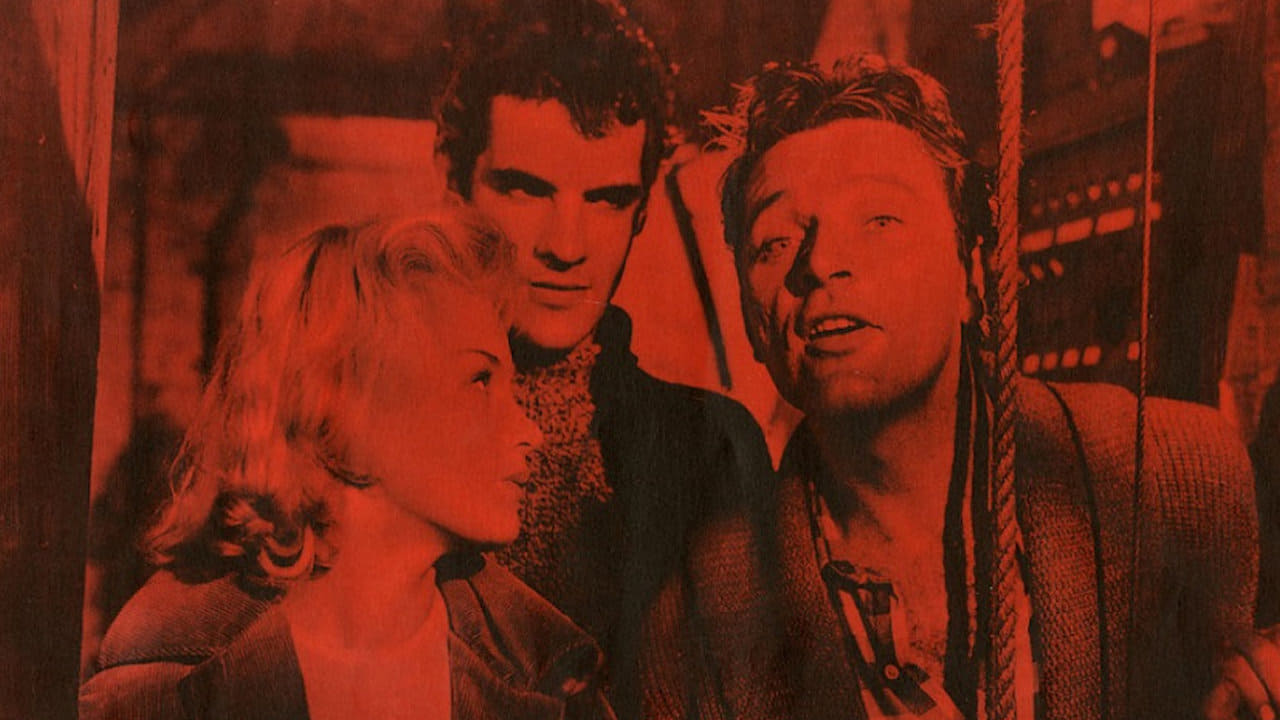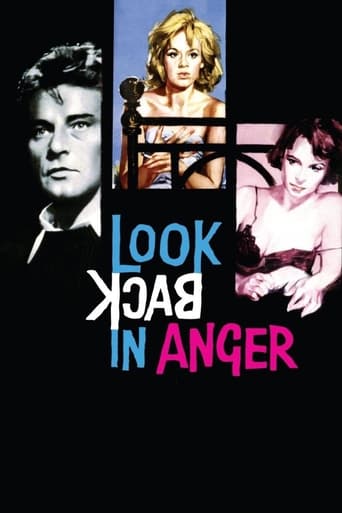



There is just so much movie here. For some it may be too much. But in the same secretly sarcastic way most telemarketers say the phrase, the title of this one is particularly apt.
View MoreIt is both painfully honest and laugh-out-loud funny at the same time.
View MoreIt's a good bad... and worth a popcorn matinée. While it's easy to lament what could have been...
View MoreStory: It's very simple but honestly that is fine.
I've seen over thirty Richard Burton movies, and there really isn't any good reason to watch this one. Even if you particularly like his acting, all he does is shout cruelties for ninety minutes. And even if you particularly like Claire Bloom, she wears one deadpan expression for ninety minutes. There's just no point to Look Back in Anger, besides an intriguing title.A married couple doesn't get along, and for no explained reason a mutual male friend lives with them in their English flat. Also, for no explained reason, the male friend never stands up to Richard Burton when he berates his wife. And, it's never really explained why the two were married in the first place, or why they haven't thrown in the towel since whatever they have isn't working. Claire Bloom invites her actress girlfriend Mary Ure to stay with them for a couple of weeks, and even though Richard and Mary claim to hate each other, we can all guess what's going to happen. Figure that you've guessed correctly and rent Who's Afraid of Virginia Woolf? instead.
View MoreLOOK BACK IN ANGER has the distinction of being one of the first kitchen sink dramas that would become all the rage in the early 1960s. It's an adaptation of the famous John Osborne play about an angry young man and the love triangle in which he finds himself involving his wife and her best friend. I was surprised to see that Nigel Kneale adapted the story for the screen as this is well away from his comfort zone of science fiction and weirdness.The film features a typically bullish performance from Richard Burton as the protagonist who spends the entire running time bullying the women in his life (apart from his mother, as he loves her). Yes, the film is in essence a couple of of hours of Burton abusing people, so I didn't find it particularly entertaining. The characters are certainly well drawn with plenty of depth and more than realistic, but as a slice-of-life story nothing much really happens during the running time (there are no character arcs or anything like that) and I was left feeling depressed about what I'd just watched more than anything else.
View MoreA movie carried almost entirely by Richard Burton's powerful performance. Plot is quite basic: young married man is angry and everything and everyone. Not much is explained, and his anger sometimes seems contrived or manufactured. Conclusion isn't entirely satisfactory. Burton's portrayal of the young man is something to behold. Intense, overwhelming and with the ever-present threat of him committing some sort of physical violence. It does wear thin though. After a while the whole "What you angry with? What you got?" type routine is overdone and you feel some positivity is in order. Surely nobody is that grumpy, cynical and malicious all the time? There is a respite eventually, but it is very late in the piece.Good support from Claire Bloom, Mary Ure and Gary Raymond.
View MoreInterestingly, for a film celebrated for its unrelenting realism, 'Look Back in Anger (1958)' is entrenched in theatricality. From the compact cast, the cramped sets, and the verbose dialogue, I guessed (correctly, as it turned out) that Tony Richardson's film was surely adapted from a play. John Osborne's production of "Look Back in Anger" initially premiered in 1956 to considerable success, and the characteristic harshness of his writing, exposing the unpleasant underbelly of working-class life, spawned the phrase "angry young men" to describe Osborne and other British playwrights who explored similar themes. Richardson's film triggered what is often described as a British New Wave, a movement of important (or perhaps self-important) films that explored pressing political issues and, in particular, the social alienation borne from class distinction. Easily the best example I've come across so far is Jack Clayton's 'Room at the Top (1959),' which obviously followed in the footsteps of this picture. The film's strong, intimate cast includes Richard Burton, Claire Bloom (of Chaplin's 'Limelight (1952)'), Mary Ure, Gary Raymond and Donald Pleasence.Over the years, many films have explored the anger and prejudices of disturbed and alienated men. But, even in the most powerful of these such as Scorsese's 'Taxi Driver (1976)' and 'Raging Bull (1980)' the filmmaker distances himself from his characters' prejudices. 'Look Back in Anger' doesn't seem to do this. Whether it's Osborne's dialogue, or Burton's phenomenal execution, everything Jimmy Porter says comes across as a genuinely bitter attack on contemporary society. When Porter questions the worth of his wife, or cruelly disparages her middle-class parents, the attack seems to be coming from the author himself {my research tells me that Osborne's play was strongly autobiographical, based on his failed marriage to Pamela Lane this offers some explanation for the apparent bitterness}. In fact, so venomous is Porter's tongue that wife Alison is afraid to reveal to him that she's pregnant, and, shockingly, he appears not to care, in any case. Only towards maternal-figure Mrs Tanner (Edith Evans) does he show genuine compassion, his hostility is only amplified by her passing.Richard Burton, however tied to the stage is his performance, nonetheless commands the screen in every scene. His anger is so pure and undiluted, made all the more shocking because he otherwise speaks with the eloquence of an educated and civilised man. If its dialogue is undoubtedly tied to the stage, then 'Look Back in Anger' achieves realism through its more cinematic traits. The film was photographed by Oswald Morris a talented cinematographer who also worked with, among others, Stanley Kubrick, John Huston and Carol Reed who exquisitely captures the shadowy decadence of working-class London. There's a grittiness to Porter's squalid surroundings, sometimes he almost seems trapped in a noirish urban backwater. Stylistically, the film closely resembles Lean's 'Brief Encounter (1945)' probably because both have brilliant scenes set on a railway platform, amid the smoke of a idle locomotive. Subsequent "kitchen sink" dramas also owe their visual aesthetic to Morris' work here, just as British cinema owes its brief late-1950s revival to Osborne and Richardson.
View More